- Home
- Fergus Hume
Madame Midas Page 2
Madame Midas Read online
Page 2
The result of this blind confidence justified the warnings of her friends—for as soon as Villiers found himself in full possession of his wife’s fortune, he immediately proceeded to spend all the money he could lay his hands on. He gambled away large sums at his club, betted extensively on the turf, kept open house, and finally became entangled with a lady whose looks were much better than her morals, and whose capacity for spending money so far exceeded his own that in two years she completely ruined him. Mrs Villiers put up with this conduct for some time, as she was too proud to acknowledge she had made a mistake in her choice of a husband; but when Villiers, after spending all her wealth in riotous living, actually proceeded to ill-treat her in order to force her to give up the money her father had settled on her, she rebelled. She tore off her wedding- ring, threw it at his feet, renounced his name, and went off to Ballarat with her old nurse and the remnants of her fortune.
Mr Villiers, however, was not displeased at this step; in fact, he was rather glad to get rid of a wife who could no longer supply him with money, and whose presence was a constant rebuke. He sold up the house and furniture, and converted all available property into cash, which cash he then converted into drink for himself and jewellery for his lady friend. The end soon came to the fresh supply of money, and his lady friend went off with his dearest companion, to whose purse she had taken a sudden liking. Villiers, deserted by all his acquaintances, sank lower and lower in the social scale, and the once brilliant butterfly of fashion became a billiard marker, then a tout at races, and finally a bar loafer with no visible means of support.
Meantime Mrs Villiers was prospering in Ballarat, and gaining the respect and good opinion of everyone, while her husband was earning the contempt of not only his former friends but even of the creatures with whom he now associated. When Mrs Villiers went up to Ballarat after her short but brilliant life in Melbourne she felt crushed. She had given all the wealth of her girlish affection to her husband, and had endowed him with all kinds of chivalrous attributes, only to find out, as many a woman has done before and since, that her idol had feet of clay. The sudden shock of the discovery of his baseness altered the whole of her life, and from being a bright, trustful girl, she became a cold suspicious woman who disbelieved in everyone and in everything.
But she was of too restless and ambitious a nature to be content with an idle life, and although the money she still possessed was sufficient to support her in comfort, yet she felt that she must do something, if only to keep her thoughts from dwelling on those bitter years of married life. The most obvious thing to do in Ballarat was to go in for gold-mining, and chance having thrown in her way a mate of her father’s, she determined to devote herself to that, being influenced in her decision by the old digger. This man, by name Archibald McIntosh, was a shrewd, hard-headed Scotchman, who had been in Ballarat when the diggings were in the height of their fame, and who knew all about the lie of the country and where the richest leads had been in the old days. He told Mrs Villiers that her father and himself had worked together on a lead then known as the Devil’s Lead, which was one of the richest ever discovered in the district. It had been found by five men, who had agreed with one another to keep silent as to the richness of the lead, and were rapidly making their fortunes when the troubles of the Eureka stockade intervened, and, in the encounter between the miners and the military, three of the company working the lead were killed, and only two men were left who knew the whereabouts of the claim and the value of it. These were McIntosh and Curtis, who were the original holders. Mr Curtis, went down to Melbourne, and, as previously related, died of heart disease, so the only man left of the five who had worked the lead was Archibald McIntosh. He had been too poor to work it himself, and, having failed to induce any speculator to go in with him to acquire the land, he had kept silent about it, only staying up at Ballarat and guarding the claim lest someone else should chance on it. Fortunately the place where it was situated had not been renowned for gold in the early days, and it had passed into the hands of a man who used it as pasture land, quite ignorant of the wealth which lay beneath. When Mrs Villiers came up to Ballarat, this man wanted to sell the land, as he was going to Europe; so, acting under the urgent advice of McIntosh, she sold out of all the investments which she had and purchased the whole tract of country where the old miner assured her solemnly the Devil’s Lead was to be found.
Then she built a house near the mine, and taking her old nurse, Selina Sprotts, and Archibald McIntosh to live with her, sank a shaft in the place indicated by the latter. She also engaged miners, and gave McIntosh full control over the mine, while she herself kept the books, paid the accounts, and proved herself to be a first-class woman of business. She had now been working the mine for two years, but as yet had not been fortunate enough to strike the lead. The gutter, however, proved remunerative enough to keep the mine going, pay all the men, and support Mrs Villiers herself, so she was quite content to wait till fortune should smile on her, and the long- looked-for Devil’s Lead turned up. People who had heard of her taking the land were astonished at first, and disposed to scoff, but they soon begun to admire the plucky way in which she fought down her ill-luck for the first year of her venture. All at once matters changed; she made a lucky speculation in the share market, and the Pactolus claim began to pay. Mrs Villiers became mixed up in mining matters, and bought and sold on ‘Change with such foresight and promptitude of action that she soon began to make a lot of money. Stockbrokers are not, as a rule, romantic, but one of the fraternity was so struck with her persistent good fortune that he christened her Madame Midas, after that Greek King whose touch turned everything into gold. This name tickled the fancy of others, and in a short time she was called nothing but Madame Midas all over the country, which title she accepted complacently enough as a forecast of her success in finding the Devil’s Lead, which idea had grown into a mania with her as it already was with her faithful henchman, McIntosh.
When Mr Villiers therefore arrived in Ballarat, he found his wife universally respected and widely known as Madame Midas, so he went to see her, expecting to be kept in luxurious ease for the rest of his life. He soon, however, found himself mistaken, for his wife told him plainly she would have nothing to do with him, and that if he dared to show his face at the Pactolus claim she would have him turned off by her men. He threatened to bring the law into force to make her live with him, but she laughed in his face, and said she would bring a divorce suit against him if he did so; and as Mr Villiers’ character could hardly bear the light of day, he retreated, leaving Madame in full possession of the field.
He stayed, however, in Ballarat, and took up stockbroking—living a kind of hand-to-mouth existence, bragging of his former splendour, and swearing at his wife for what he was pleased to call—her cruelty. Every now and then he would pay a visit to the Pactolus, and try to see her, but McIntosh was a vigilant guard, and the miserable creature was always compelled to go back to his Bohemian life without accomplishing his object of getting money from the wife he had deserted.
People talked, of course, but Madame did not mind. She had tried married life, and had been disappointed; her old ideas of belief in human nature had passed away; in short, the girl who had been the belle of Melbourne as Miss Curtis and Mrs Villiers had disappeared, and the stern, clever, cynical woman who managed the Pactolus claim was a new being called ‘Madame Midas’.
CHAPTER II. SLIVERS
Everyone has heard of the oldest inhabitant—that wonderful piece of antiquity, with white hair, garrulous tongue, and cast-iron memory,- -who was born with the present century—very often before it—and remembers George III, the Battle of Waterloo, and the invention of the steam-engine. But in Australia, the oldest inhabitant is localized, and rechristened an early settler. He remembers Melbourne before Melbourne was; he distinctly recollects sailing up the Yarra Yarra with Batman, and talks wildly about the then crystalline purity of its waters—an assertion which we of to-day feel is open to consi
derable doubt. His wealth is unbounded, his memory marvellous, and his acquaintances of a somewhat mixed character, comprising as they do a series of persons ranging from a member of Parliament down to a larrikin.
Ballarat, no doubt, possesses many of these precious pieces of antiquity hidden in obscure corners, but one especially was known, not only in the Golden City, but throughout Victoria. His name was Slivers—plain Slivers, as he said himself—and, from a physical point of view, he certainly spoke the truth. What his Christian name was no one ever knew; he called himself Slivers, and so did everyone else, without even an Esquire or a Mister to it—neither a head nor a tail to add dignity to the name.
Slivers was as well known in Sturt Street and at ‘The Corner’ as the town clock, and his tongue very much resembled that timepiece, inasmuch as it was always going. He was a very early settler; in fact, so remarkably early that it was currently reported the first white men who came to Ballarat found Slivers had already taken up his abode there, and lived in friendly relations with the local blacks. He had achieved this amicable relationship by the trifling loss of a leg, an arm, and an eye, all of which portions of his body were taken off the right side, and consequently gave him rather a lop-sided appearance. But what was left of Slivers possessed an abundant vitality, and it seemed probable he would go on living in the same damaged condition for the next twenty years.
The Ballarat folk were fond of pointing him out as a specimen of the healthy climate, but this was rather a flight of fancy, as Slivers was one of those exasperating individuals who, if they lived in a swamp or a desert, would still continue to feel their digestions good and their lungs strong.
Slivers was reputed rich, and Arabian-Night-like stories were told of his boundless wealth, but no one ever knew the exact amount of money he had, and as Slivers never volunteered any information on the subject, no one ever did know. He was a small, wizen-looking little man, who usually wore a suit of clothes a size too large for him, wherein scandal-mongers averred his body rattled like a dried pea in a pod. His hair was white, and fringed the lower portion of his yellow little scalp in a most deceptive fashion. With his hat on Slivers looked sixty; take it off and his bald head immediately added ten years to his existence. His one eye was bright and sharp, of a greyish colour, and the loss of the other was replaced by a greasy black patch, which gave him a sinister appearance. He was cleaned shaved, and had no teeth, but notwithstanding this want, his lips gripped the stem of his long pipe in a wonderfully tenacious and obstinate manner. He carried on the business of a mining agent, and knowing all about the country and the intricacies of the mines, he was one of the cleverest speculators in Ballarat.
The office of Slivers was in Sturt Street, in a dirty, tumble-down cottage wedged between two handsome modern buildings. It was a remnant of old Ballarat which had survived the rage for new houses and highly ornamented terraces. Slivers had been offered money for that ricketty little shanty, but he declined to sell it, averring that as a snail grew to fit his house his house had grown to fit him.
So there it stood—a dingy shingle roof overgrown with moss—a quaint little porch and two numerously paned windows on each side. On top of the porch a sign-board—done by Slivers in the early days, and looking like it—bore the legend ‘Slivers, mining agent.’ The door did not shut—something was wrong with it, so it always stood ajar in a hospitable sort of manner. Entering this, a stranger would find himself in a dark low-roofed passage, with a door at the end leading to the kitchen, another on the right leading to the bedroom, and a third on the left leading to the office, where most of Slivers’ indoor life was spent. He used to stop here nearly all day doing business, with the small table before him covered with scrip, and the mantelpiece behind him covered with specimens of quartz, all labelled with the name of the place whence they came. The inkstand was dirty, the ink thick and the pens rusty; yet, in spite of all these disadvantages, Slivers managed to do well and make money. He used to recommend men to different mines round about, and whenever a manager wanted men, or new hands wanted work, they took themselves off to Slivers, and were sure to be satisfied there. Consequently, his office was nearly always full; either of people on business or casual acquaintances dropping in to have a drink—Slivers was generous in the whisky line—or to pump the old man about some new mine, a thing which no one ever managed to do. When the office was empty, Slivers would go on sorting the scrip on his table, drinking his whisky, or talking to Billy. Now Billy was about as well known in Ballarat as Slivers, and was equally as old and garrulous in his own way. He was one of those large white yellow-crested cockatoos who, in their captivity, pass their time like galley-slaves, chained by one leg. Billy, however, never submitted to the indignity of a chain—he mostly sat on Slivers’ table or on his shoulder, scratching his poll with his black claw, or chattering to Slivers in a communicative manner. People said Billy was Slivers’ evil spirit, and as a matter of fact, there was something uncanny in the wisdom of the bird. He could converse fluently on all occasions, and needed no drawing out, inasmuch as he was always ready to exhibit his powers of conversation. He was not a pious bird—belonging to Slivers, he could hardly be expected to be—and his language was redolent of Billingsgate. So Billy being so clever was quite a character in his way, and, seated on Slivers’ shoulder with his black bead of an eye watching his master writing with the rusty pen, they looked a most unholy pair.
The warm sunlight poured through the dingy windows of the office, and filled the dark room with a sort of sombre glory. The atmosphere of Slivers’ office was thick and dusty, and the sun made long beams of light through the heavy air. Slivers had pushed all the scrip and loose papers away, and was writing a letter in the little clearing caused by their removal. On the old-fashioned inkstand was a paper full of grains of gold, and on this the sunlight rested, making it glitter in the obscurity of the room. Billy, seated on Slivers’ shoulder, was astonished at this, and, inspired by a spirit of adventure, he climbed down and waddled clumsily across the table to the inkstand, where he seized a small nugget in his beak and made off with it. Slivers looked up from his writing suddenly: so, being detected, Billy stopped and looked at him, still carrying the nugget in his beak.
‘Drop it,’ said Slivers severely, in his rasping little voice. Billy pretended not to understand, and after eyeing Slivers for a moment or two resumed his journey. Slivers stretched out his hand for the ruler, whereupon Billy, becoming alive to his danger, dropped the nugget, and flew down off the table with a discordant shriek.
‘Devil! devil! devil!’ screamed this amiable bird, flopping up and down on the floor. ‘You’re a liar! You’re a liar! Pickles.’
Having delivered himself of this bad language, Billy waddled to his master’s chair, and climbing up by the aid of his claws and beak, soon established himself in his old position. Slivers, however, was not attending to him, as he was leaning back in his chair drumming in an absent sort of way with his lean fingers on the table. His cork arm hung down limply, and his one eye was fixed on a letter lying in front of him. This was a communication from the manager of the Pactolus Mine requesting Slivers to get him more hands, and Slivers’ thoughts had wandered away from the letter to the person who wrote it, and from thence to Madame Midas.
‘She’s a clever woman,’ observed Slivers, at length, in a musing sort of tone, ‘and she’s got a good thing on in that claim if she only strikes the Lead.’
‘Devil,’ said Billy once more, in a harsh voice.
‘Exactly,’ answered Slivers, ‘the Devil’s Lead. Oh, Lord! what a fool I was not to have collared that ground before she did; but that infernal McIntosh never would tell me where the place was. Never mind, I’ll be even with him yet; curse him.’
His expression of face was not pleasant as he said this, and he grasped the letter in front of him in a violent way, as if he were wishing his long fingers were round the writer’s throat. Tapping with his wooden leg on the floor, he was about to recommence his musings, when he he
ard a step in the passage, and the door of his office being pushed violently open, a man entered without further ceremony, and flung himself down on a chair near the window.
‘Fire!’ said Billy, on seeing this abrupt entry; ‘how’s your mother!—Ballarat and Bendigo—Bendigo and Ballarat.’
The newcomer was a man short and powerfully built, dressed in a shabby-genteel sort of way, with a massive head covered with black hair, heavy side whiskers and moustache, and a clean shaved chin, which had that blue appearance common to very dark men who shave. His mouth—that is, as much as could be seen of it under the drooping moustache—was weak and undecided, and his dark eyes so shifty and restless that they seemed unable to meet a steady gaze, but always looked at some inanimate object that would not stare them out of countenance.
‘Well, Mr Randolph Villiers,’ croaked Slivers, after contemplating his visitor for a few moments, ‘how’s business?’
‘Infernally bad,’ retorted Mr Villiers, pulling out a cigar and lighting it. ‘I’ve lost twenty pounds on those Moscow shares.’
‘More fool you,’ replied Slivers, courteously, swinging round in his chair so as to face Villiers. ‘I could have told you the mine was no good; but you will go on your own bad judgment.’
‘It’s like getting blood out of a stone to get tips from you,’ growled Villiers, with a sulky air. ‘Come now, old boy,’ in a cajoling manner, ‘tell us something good—I’m nearly stone broke, and I must live.’
‘I’m hanged if I see the necessity,’ malignantly returned Slivers, unconsciously quoting Voltaire; ‘but if you do want to get into a good thing—’

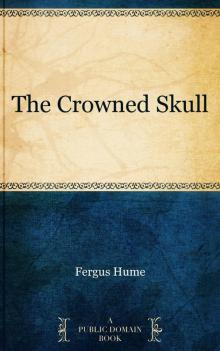 The Crowned Skull
The Crowned Skull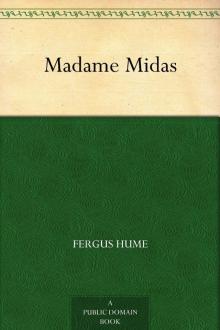 Madame Midas
Madame Midas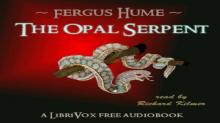 The Opal Serpent
The Opal Serpent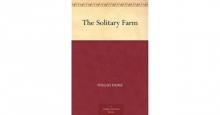 The Solitary Farm
The Solitary Farm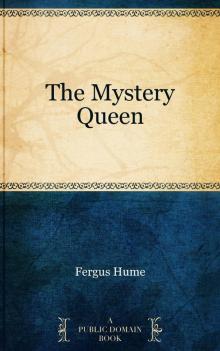 The Mystery Queen
The Mystery Queen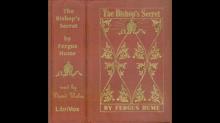 The Bishop's Secret
The Bishop's Secret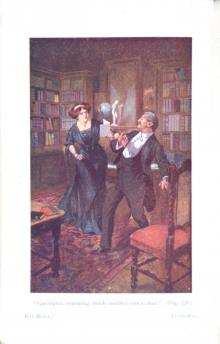 Red Money
Red Money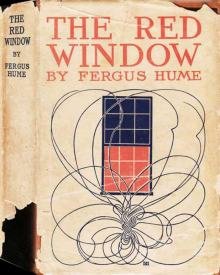 The Red Window
The Red Window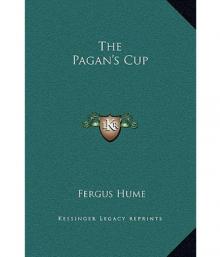 The Pagan's Cup
The Pagan's Cup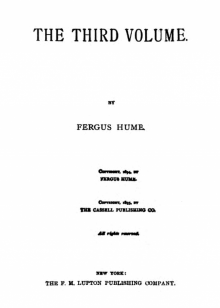 The Third Volume
The Third Volume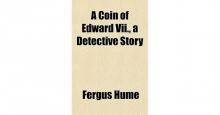 A Coin of Edward VII: A Detective Story
A Coin of Edward VII: A Detective Story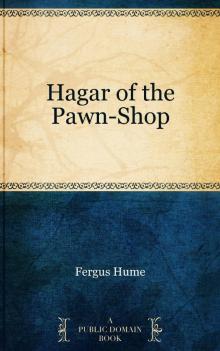 Hagar of the Pawn-Shop
Hagar of the Pawn-Shop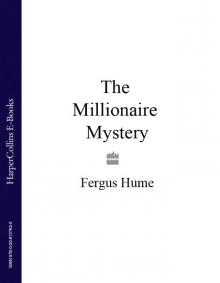 The Millionaire Mystery
The Millionaire Mystery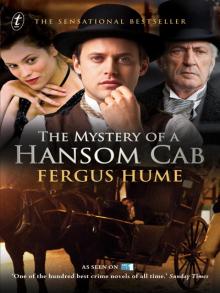 The Mystery of a Hansom Cab
The Mystery of a Hansom Cab